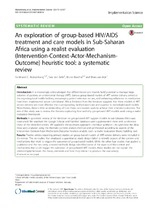Towards developing an initial programme theory: Programme designers and managers assumptions on the antiretroviral treatment adherence club programme in primary health care facilities in the metropolitan area of Western Cape province, South Africa
Date
2016Author
Mukumbang, Ferdinand C.
van Belle, Sara
Marchal, Bruno
van Wyk, Brian
Metadata
Show full item recordAbstract
Background
The antiretroviral adherence club intervention was rolled out in primary health care facilities
in the Western Cape province of South Africa to relieve clinic congestion, and improve
retention in care, and treatment adherence in the face of growing patient loads. We adopted
the realist evaluation approach to evaluate what aspects of antiretroviral club intervention
works, for what sections of the patient population, and under which community and health
systems contexts, to inform guidelines for scaling up of the intervention. In this article, we
report on a step towards the development of a programme theoryÐthe assumptions of programme
designers and health service managers with regard to how and why the adherence
club intervention is expected to achieve its goals and perceptions on how it has done so (or
not).
Methods
We adopted an exploratory qualitative research design. We conducted a document review
of 12 documents on the design and implementation of the adherence club intervention, and
key informant interviews with 12 purposively selected programme designers and managers.
Thematic content analysis was used to identify themes attributed to the programme
actors, context, mechanisms, and outcomes. Using the context-mechanism-outcome configurational
tool, we provided an explanatory focus of how the adherence club intervention
is roll-out and works guided by the realist perspective.

